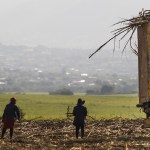ECONOMIC OUTLOOK
South Africa’s ‘polycrisis’ dims prospect of accurate forecasts of GDP performance

The economy is expected to have just dodged a recession in the first quarter of 2023. But, say economists, a confluence of disruptive factors makes it hard to predict.
After contracting by 1.3% on a quarterly basis in Q4 2022, the median estimate from a Bloomberg poll of seven economists in mid-May sees GDP growth of 0.2% in Q1. That would just avert a recession, which is typically defined as two consecutive quarters of economic contraction.
But it would also mean the ground lost in Q4 last year would not have been regained and that the economy is still smaller than it was in Q3 2022.
“Industry performed better than expected in Q1 2023, which points to a slight positive contribution to overall GDP growth,” said Jee-A van der Linde, an economist at Oxford Africa Economics.
But here’s the rub. Economists were taken aback by the scale of the 1.3% contraction in Q4 last year. A contraction of 0.4% had been expected, according to a Bloomberg forecast by economists. Bloomberg said the contraction’s size exceeded all the estimates that it had gathered.
In Q3 last year, the data also took the market by surprise, with growth of 1.6% — subsequently revised upward to 1.8% — far surpassing economists’ expectations of a more moderate quarterly expansion of 0.6%.
Economists are typically among the sharper tools in the shed. So, what is blunting their powers of perception these days?
“Economic growth has become extremely volatile in recent quarters, following an intensification in power outages,” Van der Linde said. The post-pandemic recovery has been slow and uneven, with more than half of South Africa’s economic industries yet to recover to pre-pandemic levels.
“Load shedding is also contributing to unsynchronised economic growth through higher energy-related capital imports from the private sector pushing to secure electricity generation capacity.”
Indeed, the power crisis has combined with other crises to create a “polycrisis”.
“It is tough right now to make economic forecasts because of the range of disruptive factors at play. Globally, record-high levels of uncertainty this year have been associated with the term ‘polycrisis’,” said Christie Viljoen, a senior economist at PwC.
“The concept reflects a situation where disparate crises interact in such a way that the overall impact significantly exceeds the sum of all its parts. Locally, the North-West University Business School’s Policy Uncertainty Index increased to a record level of 71.7 in Q1 2023 from 53.2 in Q4 2022.”
This means that economic and political uncertainty in South Africa is at its highest level since the index was launched in 2015. It makes forecasting, well, uncertain.
“The confluence of crises facing local business leaders is nothing short of remarkable,” Viljoen noted.
“Some of the emergencies are manifestations of once-in-a-generation risks: the Russian invasion of Ukraine, double-digit inflation in developed economies, and the ripple effects of both the pandemic and the ‘great resignation’.”
As Viljoen noted, this is a global phenomenon. South African economists are hardly outliers as the fallout from these shocks reverberates worldwide.
“In the wake of these tumultuous events, it is hardly surprising that some long-standing economic relationships appear to have broken down, leaving even the experts confounded,” The New Yorker’s John Cassidy wrote in February.
On top of these global shocks, South Africa has its own, notably the surging levels of rolling blackouts.
“Like Covid-19, economists have never had to model this kind of factor to such an extent, so it is not part of standard economic models,” said Viljoen. “And the wide-ranging stages of power cuts over time make it more challenging.
“Furthermore, the business resilience created by mitigating efforts — solar, diesel generators, etc — seen in some industries makes the calculations even more complicated.”
PwC has estimated that the power shortages may be slashing as much as five percentage points from economic growth, whereas the South African Reserve Bank has calculated the loss at 2 percentage points.
This range underscores the difficulty of accurately measuring the damage inflicted.
The same could be said for other headwinds buffeting the economy. Think, for example, of Transnet’s meltdown, the decay of the roads, and a water network that is falling apart. Then there are the costs of rampant crime, which among other things are directly impacting production in mining and other industries. South Africa is like a polycrisis on steroids, and this is largely a consequence of state failure.
Economists are understandably having a tough time measuring the overall impact on the economy of a state that is failing in almost every conceivable way, and at an accelerating pace. We’ll know on 6 June, when the GDP figures for Q1 will be released, whether a recession has been dodged or not.
But don’t be shocked if the number is far worse — or, dare we hope, better — than expected. DM
This story first appeared in our weekly Daily Maverick 168 newspaper, which is available countrywide for R29.



















Comments - Please login in order to comment.